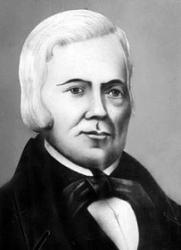Planning worship?
Check out our sister site, ZeteoSearch.org,
for 20+ additional resources related to your search.
- |
User Links
Person Results
‹ Return to hymnal


Export as CSV
Andrew Broaddus
1770 - 1848 Person Name: A. Broaddus Hymnal Number: d233 Author of "O give me, Lord, my sins to mourn" in Hymns, Psalms, and Spiritual Songs, including Some Never Before in Print Broaddus, Andrew. (Caroline County, Virginia, November 4, 1770--December 1, 1848, Salem, Virginia). Baptist. Reared an Episcopalian; became Baptist, 1789. Honorary D.D., 1843, Columbian College, Washington, D.C., "humbly refused." Ordained October 16, 1791. Pastorates at Burrus, 1793-1820; while at Burrus also served Bethel, Fredericksburg, Upper Zion, Beulah, and Mangohick on rotational basis; Salem, 1820-1848; Upper King and Queen, 1827-1848, all in Viriginia. Author of The Age of Reason and Revelation (1795) (a reply to Paine's attack on Christianity); A Bible History for Schools and Families (Baltimore, 1816); Help for Children: Three Plain and Easy Catechisms (American Baptist Publication Society, n.d.). Edited Christian Baptist (1826-1830) and wrtoe for it under the pen name "Paulinus" and for Religious Herald under pen name "Christianos" arguing with Alexander Campbell. Designed a seal for Richmond College, 1843 (now University of Richmond).
Published Collection of Sacred Ballads (1790) of songs in popular use at the time; compiled Dover Selection (1828) (xvii, 275, vii, 75p.), 2d ed, 1829 (viii 1 l., 11-412 p.) at request of Dover Association of Virginia Baptists; Virginia Selection (1836) (xxviii, 447 p.), rev. enl. ed. (600 p.) 1840, reprinted until 1876.
Hymns:
In the Dover Selection (1829): Help thy servant, gracious Lord, 192 (labelled "Original")
In the Virginia Selection (1840), three hymns indicated by initials "A.B.": Help thy servant, gracious Lord, 665; Send thy blessing Lord we pray, 667; Restless thy spirit poor wandering sinner, 708. One hymn (Labelled "Chiefly original"): How solemn the signal I hear! 495.
--Martha C. Powell, DNAH Archives
Andrew Broaddus
Thomas Cleland
Hymnal Number: d101 Author of "Farewell, loving [lovely] Christian [Christians], the time is at hand" in Hymns, Psalms, and Spiritual Songs, including Some Never Before in Print
Thomas Cleland
J. Brewer

1752 - 1817 Hymnal Number: d120 Author of "Hail, sovereign love, that first began" in Hymns, Psalms, and Spiritual Songs, including Some Never Before in Print Brewer, Jehoiada, the "Sylvestris" of the Gospel Magazine, 1776, &c, was born at Newport, Monmouthshire, in 1752. He was educated for commercial pursuits, but subsequently became a Congregational Minister, and as such was pastor at Rodborough, Gloucestershire; at Sheffield, to which he went in 1783; at Carr's Lane Chapel, Birmingham (1798); and at the Livery Street Chapel, in the same town. He died Aug. 24, 1817. A Memoir of him appeared in the Evangelical Register, 1835, p. 396. His best-known hymn is—"Hail, Sovereign Love, that first began" (q. v.).
-- John Julian, Dictionary of Hymnology (1907)
J. Brewer
J. L. Holman

1784 - 1842 Hymnal Number: d128 Author of "Ho, all ye sons of sin and woe" in Hymns, Psalms, and Spiritual Songs, including Some Never Before in Print Born: October 24, 1784, Danville, Kentucky.
Died: March 28, 1842, Aurora, Indiana.
Buried: Veraestau Cemetery, Aurora, Indiana.
When [Holman] was sixteen years of age he united with the Clear Creek Baptist church. For his life-work he directed his attention to the bar in Newcastle. For a while, he read law in the Lexington office of Henry Clay. On account of his opposition to slavery, he crossed the Ohio river in 1810, and made his home in Indiana, on a bluff to which he gave the name Veraestau, and where he continued to reside the remainder of his life. It appears he come into a considerable estate soon after he turned twenty-one. Five years later, he brought his slaves to Indiana for the sole purpose of freeing them.
He was named Prosecutor of Dearborn County, Indiana, in 1811. In 1814, he was elected a member of the territorial legislature, and near the close of the same year he was made presiding judge for his district. Under the state government, in 1816, he was appointed a judge of the supreme court, a position which he filled fourteen years. In 1831, he was a candidate for United States senator, losing to John Tipton by a single vote. Four years later he was appointed United States district judge for Indiana, and in this office he continued until his death.
Holman took a deep interest in missions, Sunday-schools, Bible and temperance work. In 1834, he was ordained, and on his circuits he frequently addressed large audiences upon topics connected with these enterprises. For many years he was a vice-president of the American Sunday-school Union. He was also president of the Western Baptist Publication and Sunday-school Society. For five years he was president of the Indiana Baptist Convention. He was also, from its organization, a member of the Indiana Baptist Education Society. His works include:
The Prisoners of the Niagara, or Errors of Education. A New Novel, Founded on Fact (Frankfort, Kentucky: 1810)
--www.hymntime.com/tch/
J. L. Holman
Josiah Goddard
Hymnal Number: d165 Author of "I've listed [enlisted] in the holy war" in Hymns, Psalms, and Spiritual Songs, including Some Never Before in Print
Josiah Goddard


 My Starred Hymns
My Starred Hymns


